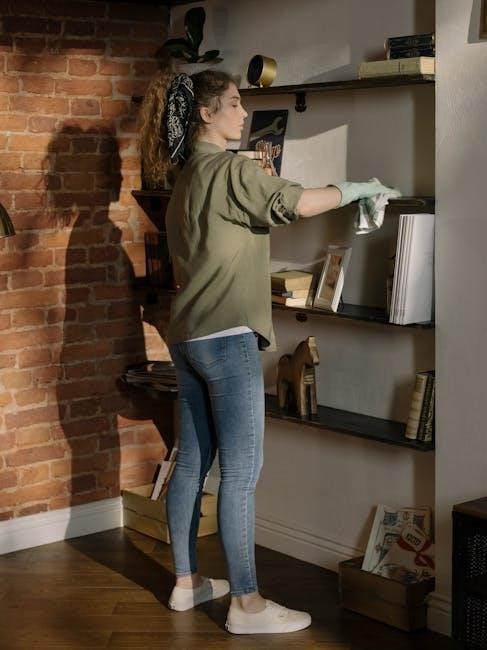Title: How to Keep a House While Drowning: A Gentle Approach to Cleaning and Organizing
K.C. Davis’s guide offers a compassionate approach to home care, sharing practical strategies and transformative principles to help individuals manage their space with kindness and clarity.
K.C. Davis’s book addresses the emotional challenges of home care, offering a gentle, non-judgmental approach to cleaning and organizing for those feeling overwhelmed by life’s demands.
2.1. Overview of the Book’s Purpose
K.C. Davis’s How to Keep House While Drowning aims to empower individuals overwhelmed by household responsibilities. The book provides a compassionate framework to transform cleaning and organizing into manageable tasks, emphasizing self-care and reducing shame. By focusing on practical strategies and emotional well-being, Davis helps readers create a functional home environment that supports their mental health. The book is designed for those struggling with feelings of inadequacy, offering a gentle, realistic approach to maintaining a home without the pressure of perfection.
2.2. The Author: K.C. Davis and Her Expertise
K.C. Davis is a licensed professional counselor and author specializing in mental health and self-care. Her expertise lies in addressing the emotional challenges of household management. Davis’s approach emphasizes self-compassion and practical strategies, drawn from her professional experience and personal journey. As a therapist, she understands the deep connection between cleaning struggles and mental well-being, offering a unique perspective that blends psychology with everyday tasks. Her work is designed to help individuals break free from shame and overwhelm, fostering a healthier relationship with home care.
The Six Transformative Principles Introduced by K.C. Davis
K.C. Davis introduces six life-changing principles to simplify home care, focusing on kindness, rest, and functionality to reduce overwhelm and foster a peaceful living environment.

3.1. Principle 1: Care Tasks Are Morally Neutral
K.C. Davis’s first principle emphasizes that cleaning and organizing tasks are neither inherently good nor bad. This perspective removes the emotional burden associated with housekeeping, allowing individuals to view care tasks as neutral actions rather than moral failures. By detaching self-worth from the state of one’s home, this principle encourages a healthier mindset, reducing guilt and shame. It promotes focusing on functionality and well-being over perfection, making it easier to approach tasks without overwhelm. This mindset shift is foundational for creating a more compassionate and sustainable approach to home care.

3.2. Principle 2: Rest Is a Right, Not a Reward
K.C. Davis’s second principle challenges the idea that rest must be earned through productivity. She argues that rest is an inherent right, not a privilege reserved for when tasks are completed. This perspective helps alleviate the pressure to constantly “do more” and allows individuals to prioritize their well-being; By embracing rest as a fundamental need, people can create a more sustainable and compassionate approach to home care. This principle encourages listeners to step away from the cycle of guilt and burnout, fostering a healthier relationship with rest and productivity. It emphasizes that pausing to recharge is essential for maintaining a functional home environment.
3.3. Principle 3: You Deserve Kindness Regardless of Your Level of Functioning
K.C. Davis emphasizes that self-compassion is vital in maintaining a balanced home environment. This principle encourages readers to embrace their current state, whether their home is messy or orderly, and to practice kindness toward themselves. Davis argues that one’s worth is not tied to their ability to keep a perfect house. By rejecting self-judgment and focusing on well-being, individuals can create a more nurturing and accepting space. This principle helps readers reframe their mindset, understanding that kindness, not criticism, is the foundation for sustainable home care and emotional peace.
3.4. Principle 4: Creating a Functional Home Environment
K.C. Davis’s fourth principle focuses on designing a home environment that prioritizes functionality over perfection. She encourages readers to start where they are, imagining their home on its messiest day, and build systems that work for their unique needs. This principle emphasizes the importance of creating spaces that are practical and adaptable, rather than striving for an unattainable ideal. By focusing on what truly matters—comfort, safety, and ease—individuals can develop a home care routine that supports their well-being. This approach fosters a sense of control and empowerment, making home maintenance feel achievable and sustainable.
3.5. Principle 5: Making Your Space Work for You
K.C. Davis’s fifth principle emphasizes the importance of tailoring your home environment to meet your unique needs and preferences. Rather than striving for perfection or adhering to societal standards, Davis advocates for creating a space that supports your productivity, relaxation, and overall well-being. This principle encourages readers to assess their daily routines and adapt their surroundings to enhance functionality. By prioritizing personal comfort and practicality, individuals can transform their homes into spaces that genuinely serve them, fostering a sense of calm and satisfaction. This approach ensures that home care becomes a tool for empowerment rather than a source of stress.
3.6. Principle 6: Practical Strategies for Home Care
K.C. Davis’s sixth principle focuses on actionable steps to maintain a home without overwhelm. Strategies include breaking tasks into manageable chunks, using timers for focused cleaning sessions, and prioritizing high-impact areas. Davis also suggests implementing a “one-touch rule” for clutter and leveraging multi-functional cleaning products. These tactics reduce stress and create a sustainable routine. By adapting these methods to their unique circumstances, individuals can achieve a balanced living space that supports their well-being. Davis’s approach emphasizes adaptability, ensuring long-term success and a more manageable home care experience.

Practical Strategies for Cleaning and Organizing
K.C. Davis provides actionable advice, emphasizing starting small, creating adaptable routines, and embracing rest as part of the process. She advocates for kindness and reducing perfectionism to foster a sustainable approach to home care.
4.1. Starting Small: How to Begin When Overwhelmed
K.C. Davis suggests tackling one area at a time, focusing on what brings the most relief. She recommends setting achievable goals, like cleaning a single shelf or wiping the sink, to build momentum without causing burnout. Breaking tasks into manageable steps helps reduce overwhelm and fosters a sense of accomplishment. Davis emphasizes that progress, no matter how small, is a valid step toward a more organized and peaceful living space.
4.2. Creating a Routine That Works for You

K.C. Davis advocates for flexibility and self-compassion when establishing routines. She suggests identifying personal priorities and energy levels to create a schedule that aligns with your capabilities. Start with small, consistent tasks, like tidying for five minutes daily, and gradually expand as comfort allows. Davis emphasizes resting when needed, as it’s essential for sustainability. The key is to adapt routines to fit your life, ensuring they bring relief rather than stress. By focusing on progress over perfection, you can build a manageable and balanced cleaning practice that nurtures well-being.
4.3. The Importance of Self-Compassion in Home Care
K.C. Davis stresses the transformative power of self-compassion in home care. By embracing kindness toward yourself, you can reduce guilt and stress associated with an imperfect home. Davis encourages viewing a messy space not as a personal failure but as a sign of being overwhelmed. Self-compassion helps break the cycle of burnout and fosters a healthier relationship with cleaning. Treat yourself with the same grace you’d offer a friend, understanding that your best effort is enough. This mindset shifts cleaning from a source of shame to a practice of self-care, creating a more balanced and peaceful home environment.

Addressing Mental and Emotional Aspects of Housekeeping
K.C. Davis highlights how emotional well-being deeply impacts housekeeping. Anxiety and overwhelm can paralyze, but her approach gently guides readers to alleviate these feelings, fostering a balanced home and mind.
5.1. Reducing Overwhelm and Anxiety Related to Cleaning
K.C. Davis emphasizes that overwhelm and anxiety often stem from unrealistic expectations. She encourages readers to acknowledge their emotions and reframe cleaning as a form of self-care. By breaking tasks into manageable steps and prioritizing rest, individuals can alleviate stress. Davis suggests starting with small, achievable goals to build confidence and reduce feelings of being overwhelmed. Her approach advocates for self-compassion, reminding readers that a messy home doesn’t reflect their worth. The goal is to create a peaceful environment, not perfection, fostering mental well-being alongside a tidy space.
5.2. The Role of Rest in Maintaining a Balanced Home Environment
Rest is a cornerstone of K.C. Davis’s approach, emphasizing that it is a right, not a reward. By prioritizing rest, individuals can avoid burnout and create a sustainable home care routine. Davis advocates for self-compassion, encouraging readers to embrace rest as a necessity rather than a luxury. This mindset helps reduce stress and fosters a balanced environment where mental well-being and practical tasks coexist harmoniously. By valuing rest, individuals can maintain their homes without compromising their emotional health, leading to a more peaceful and functional living space.
K.C. Davis’s guide empowers readers to embrace a gentle, compassionate approach to home care, emphasizing rest, self-kindness, and practical strategies to create a balanced, thriving environment.
6.1. Summary of Key Takeaways
K.C. Davis’s book offers a compassionate guide to home care, emphasizing six transformative principles: care tasks as morally neutral, rest as a right, self-kindness, functional environments, spaces that work for you, and practical strategies. By shifting mindset and embracing self-compassion, readers can reduce overwhelm and anxiety, creating a balanced home. The guide encourages small, manageable steps and a routine that aligns with personal needs. Davis’s approach prioritizes emotional well-being, reminding us that rest and kindness are essential to maintaining a thriving space. Her strategies empower individuals to find clarity and peace in their daily lives.
6.2. Encouragement to Implement the Strategies
Embrace K.C. Davis’s gentle approach with confidence, knowing small steps lead to meaningful change. Celebrate progress, no matter how minor, and practice self-compassion. Remember, home care is a journey, not a race. By prioritizing rest and kindness, you create a space that reflects your well-being. Start with one principle, like morally neutral care tasks, and gradually incorporate others. Trust the process and allow yourself grace as you build routines that work for you. This approach not only transforms your home but also nurtures your mental health, helping you find peace in daily life. Consistency, not perfection, is key.

Additional Resources and Where to Find the Book
Discover more resources and download the PDF version of How to Keep a House While Drowning on platforms like oceanofpdf.com or through major online bookstores.
7.1. How to Download the PDF Version
To download the PDF version of How to Keep a House While Drowning, visit platforms like oceanofpdf.com or search for the book on popular ebook platforms. Use search terms such as “How to Keep a House While Drowning PDF” to find reliable sources. Ensure the website is trustworthy before proceeding with the download. Many sites offer free downloads, but always verify the file’s safety. Once downloaded, you can access the book’s transformative principles and practical strategies anytime, making it easy to apply the gentle approach to cleaning and organizing.
7.2. Recommended Reading and Further Learning
For further learning, explore books and resources that align with K.C. Davis’s gentle approach to home care. Consider titles focused on minimalism, mindful organizing, and emotional well-being. Websites like oceanofpdf.com and other ebook platforms often feature complementary works. Additionally, K.C. Davis’s other writings and online courses offer deeper insights into her principles. Join online communities or forums discussing gentle cleaning strategies to connect with others on similar journeys. These resources will enhance your understanding and provide ongoing support for maintaining a balanced, compassionate home environment.
Final Takeaway: Embracing a Gentle Approach to Home Care
K.C. Davis’s guide encourages embracing a gentle, compassionate approach to home care, transforming it from a source of stress to an act of self-love. By prioritizing rest, self-compassion, and practical strategies, individuals can create a functional, nurturing environment without overwhelm. The key takeaway is that home care is not about perfection but about kindness and sustainability. This approach empowers everyone, regardless of their circumstances, to find peace and balance in their living space. Start small, be patient, and remember that your well-being is as important as your home’s tidiness.
